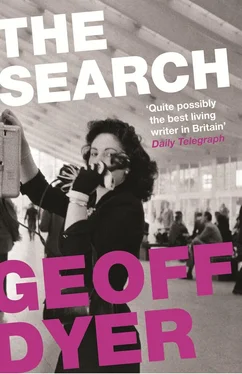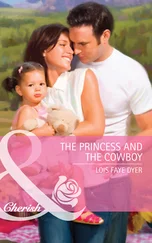It was so bright outside that he walked into a pharmacy for a pair of sunglasses that made the faded pinks and oranges of the buildings flare up darkly beneath the brown-blue sky. There were details everywhere. It was impossible to miss anything. A NO LITTERING sign with lovers’ initials scratched into the paintwork. A beer can crushed flat in the road. A shutter banging in the wind. A dust-smeared window. A spectrum-smeared puddle.
He came to a garage whose forecourt was crowded with second-hand cars. From the office he took several sets of keys, one of which fitted a red Ford. He manoeuvred out of the garage and drove to a grocery where he loaded up with provisions. Then, threading his way through the narrow streets, he headed out of town.
Soon he was driving along winding country roads. Hedges, fields sloping into distant hills, grazing clouds. Every couple of miles a field of rape flared yellow in the sunlight. Pulling clear of a bend he saw a chapel up ahead. He stopped the car outside the gate and walked around the squat building, the tilting gravestones.
Flowers twitched by the old walls. Brown earth, the petals, purple and blue, moving in the wind. Walker pulled open the door and stepped into the hymn-book mustiness of the church. Rows of benches, an eagle lectern, organ pipes. A stained-glass window threw a blur of colour in the middle of the aisle, highlighting the V-patterned dustprint of a shoe, Carver’s shoe.
The sun had passed behind a cloud and when he stepped outside it was cool and dull. He took the wedding photo from his pocket and positioned himself where, he guessed, the photographer must have stood. The stonework around the entrance, the hinges on the door, even the gangling arm of a rose bush — all these details matched.
He climbed back in the car, tapping the steering wheel with one hand, fingering his ear-lobe with the other. So Carver had slipped ahead of him. . He pulled out a map and studied possible routes. He was now close to the map’s eastern border but, quickly discarding other options, it seemed certain that Malory, and Carver after him, had headed still further east. He twisted the key in the ignition and drove. In an hour he had passed beyond the edge of the map.
Slowly the landscape changed, becoming drier, less fertile, empty. He stopped at every gas station and asked about Carver. Twice in the next twenty-four hours he was told that a man exactly answering his description had bought gas a couple of days earlier. Driving a blue Olds, travelling with two other men.
‘Any idea where they were heading?’
‘Only one way they can head,’ said the pump attendant, wiping a sleeve across his forehead and pointing east.
He continued driving, the landscape reducing itself to nothing, a flatness that existed only to have a road built through it. He passed through a region devastated by shelling. All around were bomb craters, rusting shellcases, burnt-out vehicles. Desert suggested the denudation of a landscape to a state of nothingness, but here the desert had been pulverized into something else, less than desert. Bombs had blown the desert apart but, since there was nothing to be blown apart, what remained was ruined emptiness.
Later he saw a yellow smudge over the horizon: a town. He drove past white houses and the entrances of large woody drives and private roads. In the city itself orange trees and palms lined litterless roads. He pulled over at a bar with tables outside. A few people were reading papers, people who didn’t need jobs. There was an identical bar across the road. The menu listed dozens of different juices, lush combinations of exotic fruit, each so delicious that it took a massive exertion of will not to drain the glass in two seconds flat — and even then you ended up downing it in under ten.
‘What’s the name of this town?’ he asked the waitress who was slim and gorgeous.
‘Juice Town,’ she said, smiling and scooping up a tip from the table next to him.
It was a good name. Everyone drank juices and ate perfect fruit and was brown and thin and fit — except for those who worked out at the fruit-processing plant. For them life was hell. They hated the sight of mangoes, kiwis and kumquats and spent their time getting wasted on cheap beer in the dangerous bars of the city’s south side.
The waitress — her name was Nadine — told him all this when he ordered his second juice cocktail. He had driven in to Juice Town through the white suburbs and would be leaving through the sprawling black ghetto. It wasn’t safe to drive there after dark; it was best to stay the night and head off first thing in the morning. He could stay at her place, she said. If he wanted to.
Her shift finished two hours later. Walker drove, Nadine gave directions. She was studying architecture and her apartment was cluttered with records, catalogues and a large drawing-board. Sketches lay flattened on the drawing-board or curled up on the floor around it. Nadine singled out a few for Walker’s inspection and then wandered off. They were studies of gargoyles with rabid teeth and bulging eyes, peering through a sleet of charcoal. While Walker was looking through them she called from the bedroom to put on a record. The sound of the shower came on.
Her albums were scattered over the floor. As he picked through them he realized he had never seen any of the things Rachel owned: her books, her tapes, useless things she had bought on holiday. Only a few of her clothes.
Walker put on the record that was on the turntable, an Indian singer called Ramamani whose name meant nothing to him. Her voice filled the room like all the happiness and all the forgiveness there could ever be.
Nadine emerged a few minutes later, wrapped in a towel, her hair streaming wet. He kissed her on the neck and she let the towel drop to the floor.
He left early, in the grey half-light. He spent his life leaving. The idea of home, for Walker, had always lain perpetually in the future. That was what had made prison bearable for him, the indefinite deferment of the present. Waiting for his life, for the consequences of his actions, to begin or to end, whichever it was.
None of the juice bars were open yet. The streets got gradually worse, the houses more decrepit. The only places open were grim twenty-four-hour cafés. Houses gave way to shacks and where before phone lines had connected smart apartment blocks to each other, here washing lines linked each shack to the next. The road became more pot-holed until it abandoned any claims to being a surfaced road and resigned itself to being a dry brown track the width of a freeway.
The sun had struggled over the blue mountains in the distance, made even more beautiful by the misery they looked down on. To the right was the giant fruit-processing plant. It sprawled for miles, like a city in its own right. The road curved towards it and then pulled away again. Walker’s side of the road was practically empty but as he left the fruit factory behind the traffic coming towards him swelled in volume. Cars and buses, men walking in the cold dawn of a hot day. At a set of lights he waited nervously as a thin gang of youths stared from a sidewalk corner. He gripped the wheel, expecting a rock to come crashing through his windshield. Then the lights changed and he moved on.
There seemed no end to the ghetto and the further he went the worse the housing became. Soon there weren’t even shacks, just lengths of corrugated iron or plastic sheets lashed together to provide a notion of shelter. It got worse and worse and then — although it didn’t get any better — it got less and less until, with the sun easing itself into the morning, he found himself surrounded by scrubland. Even this scrubland was touched by the misery which each year intruded further into it but then the clumps of burnt cans and dismal plants gave way to the flat expanse of desert, the simple angles of sun and sky.
Читать дальше












